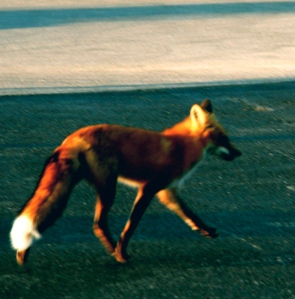Case in point: Seth Godin
February 24, 2009
Yesterday, for “One dirty diaper at a time,” I wrote about the discipline of writing, the writing craft. Doing anything well requires practice. Practice takes years of concentrated effort.
Well, persistence—one blog post, one dirty diaper at a time—has paid off for Seth Godin. He’s written 3000 posts without missing a day. That’s nose to the grindstone every day for over eight years. Granted, he enjoys himself, but that doesn’t diminish his achievement.
Congratulations, Seth, and thank you for your example.
The rest of you, do yourself a favor and subscribe to Seth’s blog. You’ll be challenged and inspired.
One dirty diaper at a time
February 23, 2009
I started blogging because I got a full-time job at Morris Creative Group—a marketing, advertising, and branding firm—and I thought that making regular posts would be a good way to keep the rust knocked off. My senior year of college, I wrote a term paper about T.S. Eliot’s poetics. I read his poetry, especially Four Quartets, and his essays on poetry and writing poetry.
What I learned while writing that paper has stuck with me. Eliot taught me that writing a good poem takes practice. Writing is like any other discipline, meaning that it’s a discipline. Chances are, you’ll only see the fruits or rewards of your many hours of hard work years down the road.
Rather than discourage us, though, Eliot’s insights offer some good news. Good writing is not some mystical occurrence to which some people gain access by stroke of fate or from which others are excluded.
Stay at it long enough, and you will improve. Invest enough gumption, sweat, and time, and you will become a proficient writer.
Eliot talks about the dual trajectories of craft and experience. Unless you take care to hone your craft, even if that means producing a canon of doggerel, you will not have the skill necessary to capture a truly significant experience. Eliot believes that five to ten years must pass before we’ve given ourselves the chance to accumulate these transformative experiences.
The question is, are you willing to take a little time every day for the next five years in hopes that you have built up enough literary muscle to lift that boulder into the light? Are you willing to accept the mundane task of dogged day-to-day effort, knowing that the payoff may be years in the future?
The answer for most of us is no.
I’m convinced, however, that most people who publish books and enjoy a positive critical and public reception are not necessarily the naturally gifted writers who sit down when the muse strikes. They are people who carve out a half hour here and there to put pen to paper, fingertips to keypad.
What stands between you and a noteworthy achievement is your lack of discipline, not your lack of inborn talent and ability.
Sure, Shakespeare was a genius and he worked hard at it. Keep in mind, we know he was a genius because he worked hard at it. People will remember you for what you actually do, not for your potential.
Now, go change the world. One writing exercise at a time. One brick at a time. One dirty diaper at a time.
*For more of this kind of stuff, read a post I wrote at work.
Seeing foxes
January 30, 2009
 I have an obsession with red foxes. I can’t remember when it began. I think I was surprised that something as impractical as a red fox even exists. What do they do all day? Steal chickens from coops? Where do they find coops in Brentwood, Tennessee, amidst the Starbucks and franchise restaurants?
I have an obsession with red foxes. I can’t remember when it began. I think I was surprised that something as impractical as a red fox even exists. What do they do all day? Steal chickens from coops? Where do they find coops in Brentwood, Tennessee, amidst the Starbucks and franchise restaurants?
One evening, my family ate at Saltgrass Grill in Franklin, Tennessee for somebody’s birthday. My dad’s side numbers over thirty now with marriages and babies. I don’t remember the food being much to talk about, but after we finished and walked outside to our cars, my mom pointed and said, “There’s a fox!” I’d seen them before, but only at night and in place with some patches of forest in the midst of suburbs and strip malls. In other words, just the type of place a suburban fox would call home. I’d catch a glimpse of bush tail just as the fox slips out of the reach of my headlights. These sightings happened at night, on Granny White Pike, or Lyon’s Bend in Knoxville, or on the road that takes you out to Mt. Vernon in Washington, D.C. I remember when I’ve seen them because a fox is in my mind a sort of cinnamon-colored, canine unicorn from Aesop’s fables. They’re cunning and sneaky. So what was that one fox doing trotting across a parking lot at sunset, as though it were on an errand, running to the grocery to pick up milk? Trotting is probably the wrong word. The movements of foxes are fluid, closer to a cat than a dog. They’re legs are long for their bodies. They have sweet, almost shy faces. They sometimes carry rabies.
I happened to have my digital SLR in the truck with me, so I drove helter-skelter after this thing as it followed an invisible path through an office park, stopping for a sniff here and there. I parked my truck and followed on foot. The fox looked at me like a cat: “What do you want, you bumbling oaf? I know all your secrets.” Then, it walked off without any sign of alarm. He looked back a few times out of curiosity. He was definitely a he. I didn’t see any tell-tale signs, but I knew. He turned around and stared at me through some fence slats: “Okay, okay, I see you. What do you want?” He finally disappeared through some Bradford Pear trees and a wall of honeysuckle behind a building. Oh, I remember now why he was a he. He lifted up his leg to pee. He didn’t seem to care who was watching. I think I know people like that. I was on a football team with about sixty of them. They also smack each other on the rear and say, “Good Game,” but from what I could tell, that fox couldn’t talk. His larynx was the wrong shape.
I digress. I got home, uploaded the pictures onto my camera, and was pleased to find several worth keeping. I set one of them as the wallpaper on my laptop. However, it wasn’t until I was writing the abstract for my Master’s thesis that I fully understood why foxes hold such significance for me. Yes, they’re mysterious creatures. They provide an apt metaphor for Ted Hughes’s poem, “The Thought-Fox.” Foxes are elusive and sudden like inspiration. “The sharp, hot stink of fox”–what a wonderfully gritty phrase. I love Roald Dahl’s stories. He wrote one called The Fantastic Mr. Fox. I think Mr. Fox was after the hens. Aren’t we all. But sitting down with a sigh to try to summarize my collection of poems in 200 words or less or whatever the count was, I realized that a fox sighting was similar in ways to encounters with the Divine. God shows up in unexpected places. If you blink, you will miss Him. You have to be paying attention, which takes practice. Brother Lawrence wrote a book called Practicing the Presence of God. Apparently, he learned to immerse himself in God’s reality while washing dishes. Jesus promised to be with us to the end of the age. God promises never to forsake us. I’ve wasted a lot of time crying and asking God where he is. I often forget that I already know where He is. His Spirit dwells inside of me. I have to practice planting myself in that truth so that by God’s grace I can live in light of it.
Keeping watch–vigilance–requires discipline. You might say that seeing God, and seeing foxes, is a lot like hitting a fastball. You have to train your spiritual eye. Some of us will never learn how to hit a fastball, so here’s the good news: if we seek, we will find. If we watch, we will see.
However, lest someone accidentally read this and misunderstand, I’m not saying seeing is believing. Faith hurts. Faith is hard. I don’t have all or even most of the answers, but when I die, I would like for people to say that I walked with a limp and took the name, “Israel,” because I wrestled with angels and cried out, “I will not let you go until you bless me.”
So then, let seeing foxes be the guiding metaphor of this blog, whatever it may become. My prayer is that we all may know God, his son Jesus, and a fox or two.